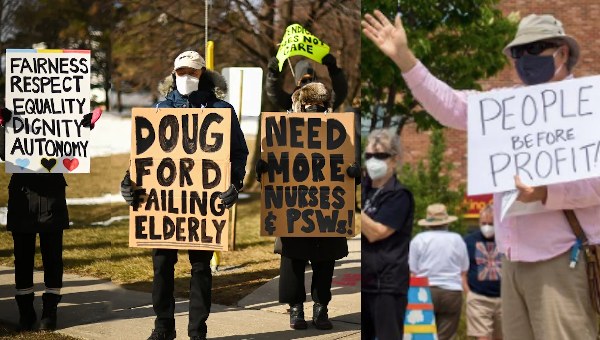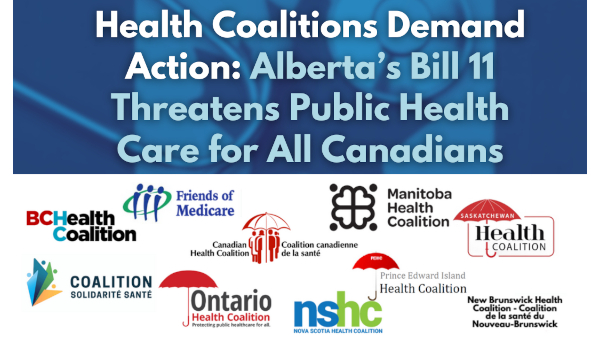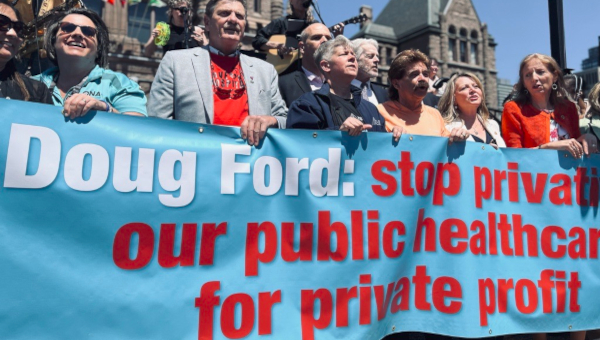Protecting Seniors? Bill 37 and the Ontario Crisis in Long-Term Care
The ‘new’ Ontario Long-Term Care legislation, Bill 37 Providing More Care, Protecting Seniors, and Building More Beds Act, 2021, has been referred to the Standing Committee on the Legislative Assembly for public hearings. Here is the Ontario Health Coalition’s analysis of the new LTC (long-term care) bill. It first outlines priorities of the Coalition, with its many union, community, and healthcare worker partners, and then provides an overview of key parts of the proposed legislation and its failings in addressing the crisis in LTC and the perils of for-profit provisioning (where the thousands of deaths over the course of the pandemic have been concentrated).

Priority Demands
To address the immediate crisis in LTC in the province, the Ontario Health Coalition proposes:
- Immediate action to fast-track improving care levels to 4-hours of care per resident per day.
- Enforcement of standards through annual surprise inspections (we support the RQI inspections that were in effect until the Ford government cancelled them in 2018), fines, license suspensions and revocation of licenses for non-compliance.
- Accountability for the terrible operators who facilitated the preventable deaths of thousands of the vulnerable residents in their care.
- That Bill 218 passed by the Ford government last fall to shield long-term care owners/operators from liability for their negligence be repealed.
- An end to for-profit long-term care, and that the Ford government reverse its plans to hand thousands of new beds and expansions to the same for-profit chains responsible for gross negligence, horror and death.
- That families and caregivers be allowed full access, and that the isolation, unlawful detention and human rights violations of long-term care residents be stopped.
New Act: Same as the Old Act or Worse?
The Ford government has gone to extreme lengths to brand this as a new LTC Act. It is not a new Act. It is almost clause by clause the existing Act. What improvements that could have and should have happened are far more than the changes that they have made. Basically, there are a few amendments to the existing act. Many of them fluff. A few of them (particularly those favouring expansion of for-profit ownership) are terrible. The most-teased promise of new enforcement is possible. Most of it currently exists and the current government has been sitting on those powers already for years without holding a single operator accountable (in fact quite the opposite). Bottom line? Lots of good sounding fluff, a few shots of strength to potential enforcement if they ever actually did it, significant damage in terms of further privatization of care to for-profit corporations.
For-Profit Privatization: They have dropped the requirement that the government promote the delivery of long-term care by non-profit organizations. They added in “AND mission driven” which are weasel words for for-profit owned facilities. There is no definition of mission driven in the new Act. Under the Ford government the for-profit Schlegel chain is considered mission driven(!). It is a gaping loophole that allows all the for-profits through, and of course we already know that the Ford government is mid-stream in awarding thousands of new beds to the same for-profit chains. This is a major loss and is not in the public interest. There are approximately 31,600 beds under current licenses that end in 2025. Most of those are for-profits. Those beds need to be rebuilt. There are 15,000 new beds to be built in the next 5 years. We, the public, are paying for all of those beds to be built and rebuilt and they should be owned and operated in the public interest as public non-profit entities. We will fight for the 46,000+ new beds to be owned and operated in the public interest not by those same for-profit corporations and chains that have caused so much suffering.
Staffing/minimum care standard: This is a reannouncement and so far the evidence does not support that this is real. Bottom line: we got it in the Act sort of. However, the struggle to win this for real continues.
Now in the Act there is a “target” to increase care to 4 hours per resident per day but not until 2025. This was released in December 2020. The plan is back-end loaded to the last two years, after the next provincial election when there is little way for advocates to hold them accountable for it. So far, the Ford government has announced and reannounced tens of thousands of staff for LTC at least four times in the last year, yet those staff have never materialized. The planned numbers are far below what is needed to get to 4-hours and staff the new beds that they say they are opening.
We have verified that they put the 4-hours of care into the Act as a “target” for 2025 and it expressly states that this is the direct care provided by RNs, RPNs and PSWs. This is a victory for us as we have been pushing for this – along with our members and affiliated organizations representing residents, families and care staff – as a priority for decades. We deserve a collective cheer. However, it is a reannouncement, it is delayed for 5 years, it is back-end loaded til the last two years, and we don’t know what a “target” in law is, it is less than a requirement, and there is no way to enforce it. Also the new bill enables the government to extend the “target” timelines in the regulations. That means that the Minister can do this by passing it through Cabinet (the Ministers in the Ford government) without going back to the Legislature. Further, we need clear requirements forcing the for-profit homes to actually report their staffing levels (currently most of them do not) and their claims about staffing hours need to be subject to inspection and must be reported publicly in the home – posted in a visible place. Also please note (above) there is no actual staffing plan to get there.
Residents’ Bill of Rights: It sounds good that they have added in pleasant-sounding clauses about residents having their lifestyle and choices respected. However, we have investigated and we have not found a single case in which a resident or family has ever successfully enforced the Bill of Rights against a LTC operator. (It is supposed to be enforceable as a contract in court.) The government surely knows this. Since actually making it meaningful is so inaccessible and difficult to do, the Bill of Rights – which has been meaningless so far – is not the place where real enforcement of improvements will happen. We are calling for a tribunal so that residents and families can actually enforce the bill of rights.
RN staffing: They have kept the requirement that each home have an RN who is not the Director of Care (DOC) 24/7. Note: they have deregulated this requirement in the orders they made under the Emergency Act and subsequent legislation.
PSW staffing: No changes in the Act. Note: we are extremely worried that they will water down the requirement currently in the regulations that PSWs be trained PSWs not untrained people. We are calling for the requirements currently in the regulations that protect against the LTC operators replacing trained PSWs with untrained people to be put into the Act.
Whistle-blower protection: We needed stronger protection and there is no change.
Requirements for Medical Directors: Absentee Medical Directors (physicians), poor care, lack of accountability were major problems exposed in the pandemic (and long predated the pandemic). There is no improvement – no change – in the language here.
Pandemic Plans: Bare bones wording has been inserted under “Emergency Plans” mentioning the requirement that there be a plan for pandemics and epidemics. Such a plan is left up to the home. If there are any further details, they are not in the Bill though there could be requirements in regulation if any regulation on this is written. At minimum the Infection Control and Prevention Leads must have a medical background. We are recommending that this lead be a nurse. At minimum the Bill must require that the pandemic plan require access to PPE in accordance with the precautionary principle for all staff.
Requirements for Licenses: They have kept in the Bill the sections that require the Ministry/Minister to consider the public interest, take into account the record of the operator, and the need for LTC beds in a particular geographic area.
Enforcement: The much-touted parts of the new act are here. They are tentatively positive. But the context in which we have to assess them is this: this government has for 3 years done nothing to hold any of the terrible operators to account despite already having the powers in the Act to fine, have provincial offenses charged, suspend licenses, revoke licenses, appoint management to take over the homes and stop new admissions (which hurts them in the pocket book). Doubling fines sounds great but the existing hefty fines ($100,000 per home or penalties provincial offenses) have never been enforced and the Ford government has been sitting on them without enacting/using them since it took office.
Process: They have given less than one day for people to apply for standing for the public hearings and only two days of public hearings with almost no notice. This is unacceptable and anti-democratic. We should all note this. •





